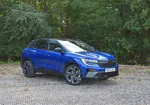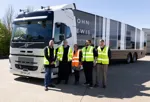With Citroën’s van sales up 22% this year in a market which has risen by 16%, now would seem to be an ideal time to take over the reins as its head of commercial vehicles and business sector operations.
Over the years Citroën has been one of the most proactive manufacturers in the sales field, looking to attract fleet business with special deals and enhanced vehicle specification.
It has paid off insofar as the French manufacturer is sitting comfortably as the fifth biggest seller of new vans in the UK.
It comes after a year where the brand had witnessed growth of 25.8% to 22,989, representing an 8.48% share of the LCV market (below 3.5t gvw).
So how will Jeremy Smith, the new man at Citroën’s fleet sales helm, continue to grow the firm’s van fleet business?
“The combination of the strong Citroën LCV range and the high level of service provided by our Business Centres to fleet customers has proved to be very successful – which is reflected by the company’s fast-growing SME sector penetration,” he says.
“It has always been the case that all Citroën dealers sell LCVs, many extremely successfully.
“My role now is to enable and encourage the non-Business Centre part of the Citroën dealer network to grow their
LCV sales.
“As such, I will be putting in place programmes which will allow these dealers to increase the LCV business, while at the same time ensuring that the Business Centre network continues to grow.”
Smith plans to adopt a ‘steady as she goes’ approach to build on the successes achieved by his predecessor Scott Michael.
“Scott and his predecessor Robert Handyside gained considerable success for Citroën LCVs during one of the most serious recessions for many years,” he says.
“I plan to adopt a ‘steady as you go’ approach to continue this growth. The key to Citroën’s LCV success in recent years has been the Business Centre network.
“It has been the company’s policy to stay clear of bulk, commodity-type fleet business, where margins are sacrificed for the sake of volume.
“There will be no change in this policy as Citroën will continue to concentrate on business which is profitable and will not undermine residual values in the future.
“Thus, Citroën will continue to concentrate on SME business through both its Business Centres and to a growing extent, the remainder of its dealer network.
“The company, through its national fleet sales area fleet management team, will also maintain its activity and considerable success in growing its national fleet business with companies with more than 50 vehicles.”
Looking forward to this year, which will see the launch of a facelifted Relay, Smith says: “The fact that Citroën can grow its market share in the face of strong competition is a good indicator of the strength of the current Nemo, Berlingo, Dispatch and Relay model line-up.
“Around half of our LCV sales are accounted for by the Berlingo. This model has benefited from a programme of continuous improvement.
“Today the Berlingo offers customers the benefits of high payloads, the widest variety of factory-built derivatives, including enhanced traction vans, chassis platforms as well as petrol, diesel, diesel micro-hybrid and electric drivelines.
“Similarly, the Dispatch is growing in popularity as more operators either downsize from large panel vans or upsize from high-cube vans such as the Berlingo.
“At the smallest end of the Citroën LCV range, the Nemo has grown steadily in popularity as more operators become aware of its ability to carry relatively large and heavy loads in a very small overall package.
“The Nemo’s success has also benefited from this model’s exceptional fuel economy.
“And, our largest LCV, the Relay, has shown continuous steady growth.
Later this year, with the introduction of the new 2014 Relay, we will have a model that builds and improves on the current model’s efficient load -carrying ability.
“With the new Relay in place and Citroën’s programme of continuous improvement, I would hope that Citroën will maintain steady growth in the face of the many new models being launched by our competitors.”
Citroën has also gained customers thank’s to its Ready to Run programme, which offers a range of conversions for fleet purposes, and Smith intends to continue offering fresh models.
“The programme is under continuous review and the individual convertors involved in Ready to Run are active in improving their products to maintain their individual sector leadership,” says Smith.
“Right from the start, Citroën set out to use the leading convertors in their specialist fields for the Ready to Run programme.
Today the programme includes tippers (made by Tipmaster), dropside trucks (made by Ingimex), Luton vans (made by Buckstone), temperature-controlled vehicles (made by Somers), glass-carrying vehicles (made by Supertrucks) and minibuses (made by Advanced).
“They are sold with a Citroën factory warranty of two years/unlimited mileage or three years/100,000 miles.
“This has enabled Citroën to grow the number of vehicles it sells with specialist conversions, a process
which has been assisted by the widespread availability of ex-stock Citroën converted product held by our Business Centres, which are now increasingly active in the converted vehicle sector.”
November sees a new law which requires all new vans to be fitted with electronic stability control (ESC).
At present Citroën charges for this safety system, so is the company was all geared up for the new law – and will it mean an increase in prices to cover the cost?
He said: “Yes. To include this feature, which is not an inexpensive item, there will be a small increase in list prices to cover the cost of this specification enhancement.”
















Login to comment
Comments
No comments have been made yet.